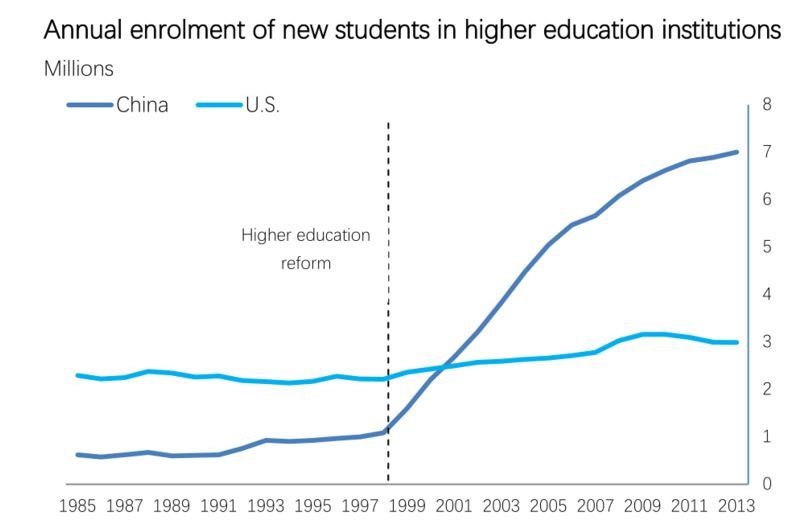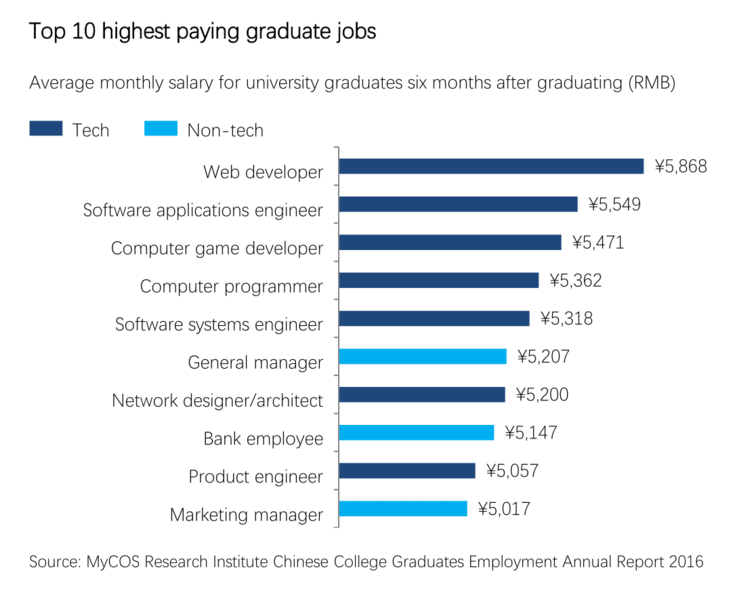China now produces twice as many graduates a year as the US

Just two decades ago, higher education in China was a rare privilege enjoyed by a small, urban elite. Image: REUTERS/Brian Snyder

Get involved with our crowdsourced digital platform to deliver impact at scale
Stay up to date:
Education
A record-breaking 8m students will graduate from Chinese universities in 2017. This figure is nearly ten times higher than it was in 1997 and is more than double the number of students who will graduate this year in the US.
Just two decades ago, higher education in China was a rare privilege enjoyed by a small, urban elite. But everything changed in 1999, when the government launched a program to massively expand university attendance. In that year alone university admissions increased by nearly 50% and this average annual growth rate persisted for the next 15 years, creating the largest influx of university educated workers into the labour market in history.
Annual enrolment of new students in higher education institutions.Author provided
Growth in the number of engineering students has been particularly explosive as part of the government’s push to develop a technical workforce which can drive innovation. But overall student numbers have increased in all subjects – even in the humanities and social sciences. New universities have sprung up and student enrolment numbers have rocketed. The second most popular subject major is in fact literature – and the fastest growing is law.

Underemployment
In 2013, Chinese citizens started blogging about the “hardest job hunting season in history” – and each year it seems to get harder for Chinese graduates. In 2017 there will be 1m more new graduates than there were in 2013. And yet, the graduate unemployment rate has remained relatively stable – according to MyCOS Research Institute, only 8% of students who graduated in 2015 were unemployed six months after graduating.
But if you delve a little deeper it’s clear that unemployment rates mask the more subtle issue of “underemployment”. While most graduates eventually find work, too many end up in part-time, low-paid jobs.
Six months after graduating, one in four Chinese university students have a salary that is below the average salary of a migrant worker, according to MyCOS data. History, law and literature have some of the lowest starting salaries, and also the lowest employment rates.
And for students who choose arts and humanities subjects in high school, the average starting salary after university is lower than that of their classmates who didn’t go to university, according to survey data. Of the 50 most common graduate occupations, 30% are low-skilled and don’t require a degree. For these students, low starting salaries and limited career progression call into question the value of their degree.
The high cost of living, particularly in big cities, has also forced millions of graduates into “ant tribes” of urban workers living in squalid conditions – often in basements – working long hours in low-paid jobs.
The big divide
But for a different group of graduates, the contrast is striking. Engineering, economics and science majors in China all enjoy high starting salaries and the top employment rates. These graduates fill the highest-paid entry positions in the most attractive employment sectors of IT, operations, real estate and finance. Chinese tech graduates do particularly well. In 2015 the top five highest paying graduate jobs were all IT related.

The government’s “Made in China 2025” strategy to become a global high-tech leader in industries such as advanced IT and robotics has created plenty of opportunities for graduates in these fields.
Not only are the starting salaries high, but long-term earnings follow a starkly different trajectory. Three years after graduating, the top 15% of engineering, economics and science graduates earn more than double the median salary for other graduates.
Wrong types of skills
Despite the rapid increase in the number of university graduates, Chinese companies complain of not being able to find the high-skilled graduates they need. The main deficit is in so-called “soft skills” such as strong communication, analytical and managerial skills. According to research by McKinsey, there is a short supply of graduates with these assets.
Chinese universities have a great track record of teaching students “hard skills”, but the test-focused education system has placed little emphasis on the development of anything else. So while graduates from technical or quantitative majors find employment because they have the necessary “hard skills”, graduates from less technical majors are hampered by their lack of both types of skills.
Two types of graduates
It seems then that the problem is not the rising number of students attending university, but that there is a mismatch between the skill composition of graduates and the skills employers need.
Demand for graduates with technical or quantitative skills has in fact risen faster than supply, resulting in attractive employment opportunities for graduates with these skills.
But for the rest, their education leaves them badly prepared for the jobs that are available. Until this changes, the polarisation in the graduate job market is likely to continue.
Don't miss any update on this topic
Create a free account and access your personalized content collection with our latest publications and analyses.
License and Republishing
World Economic Forum articles may be republished in accordance with the Creative Commons Attribution-NonCommercial-NoDerivatives 4.0 International Public License, and in accordance with our Terms of Use.
The views expressed in this article are those of the author alone and not the World Economic Forum.
The Agenda Weekly
A weekly update of the most important issues driving the global agenda
You can unsubscribe at any time using the link in our emails. For more details, review our privacy policy.
More on EducationSee all
Natalia Kucirkova
April 17, 2024
Morgan Camp
April 9, 2024
Scott Doughman
March 12, 2024
Genesis Elhussein and Julia Hakspiel
March 1, 2024
Jane Mann
February 28, 2024
Malvika Bhagwat
February 26, 2024






